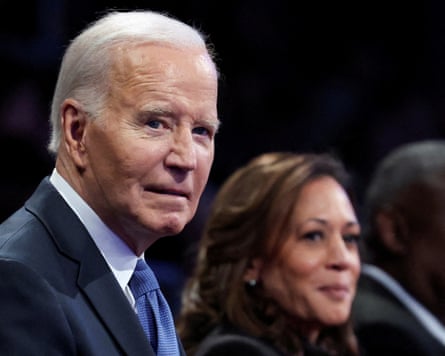Opinion
Kamala Harris’s election memoir shows just how deluded the Democrats still are | Nesrine Malik

Read more on post.
Watching the Kamala Harris presidential campaign unfold last year, I remember thinking, and writing, about how striking it was that she had been rehabilitated almost overnight into a political titan. Authoritative accounts of her before that moment portrayed a lo-fi vice-president, who, even according to people who had worked to get her there, had “not risen to the challenge of proving herself as a future leader of the party, much less the country”. Another striking feature of her campaign was how it leaned into vibes and spectacle rather than substance, or building faith in Harris as a clean break from an unpopular and visibly deteriorating Joe Biden. Her new book, 107 Days, a memoir of the exact number of days she had to win the presidency, goes a long way in explaining why that was. In short, Harris – and those around her, including supportive media parties – got high on their own supply.
This was not the intention, but 107 Days is a hilarious book. The kind of “you have to laugh or else you’ll cry” type of hilarity. As the second Trump administration unfolds in ever-more disastrous ways, Harris and the other timeline that was possible had she won take on a calamitous, mythical quality. Here she comes, alerting us to the fact that her defeat was no fateful tragedy, but a farce. There was no hidden, better version of Harris that was muzzled and limited by circumstance. There was only a woman with a formidable lack of self-awareness and a propensity to self-valorise.
The book reveals a politician who is all about the machinery of politics, rather than one with conviction spurred by a sense of duty, or a coherent and specific set of values that differentiate her. The “not a thing that comes to mind” answer she gave when asked during the campaign if there was anything she would have done differently to Biden was not caution, but the truth. There is no sign here that she would have liked to meaningfully diverge on Gaza, for example, other than to introduce more parity in the rhetoric of compassion. Or any indication that she would have liked to grasp the nettle on economic policy and make more of her accusation that Donald Trump’s economic agenda “works best if it works for those who own the big skyscrapers”.
This dearth of a unique Harris agenda explains why she often seemed so vague, skittish and rambling. How does she receive the news she will be the candidate? By reminding herself (and us) that she had the best “contact book” and “name recognition”, as well as the “strongest case”. She tries to cloak her ambition, saying “knew she could” be president, but only because she “wanted to do the work. I have always been a protector.” It’s fine to have ambition to be the president of the United States! Every cardinal dreams of becoming pope, as Cardinal Bellini of Conclave said. Even he did himself, to his shame, when he lamented upon the discovery of his ambition: “To be this age and still not know yourself.”
My abiding feeling reading was: oh God, this was all just as bad as it looked. The celebrity-packed campaign roster was not, in fact, panicked desperation, but the preference of the candidate and her team. They thought that such a range of characters would show that Harris was “welcoming everyone into the campaign” – as if the power of celebrity could do the unifying work of coalition-building, rather than her own programme and politicking. The immersion in the filmic, the celluloid of US politics is so complete that there is a line about Jon Bon Jovi performing for her and it being a good omen, because he performed for a candidate who won in The West Wing. The media loved her. “And behold,” Harris quotes a Washington Post writer, praising her approach to Gaza, “she had her boat through the impossible strait.” Jon Favreau said Harris was “a sight to behold” at the Democratic convention.
I lost count of the number of descriptions of crowds exploding, roaring, on fire. The audience applause to Harris’s Saturday Night Live appearance was some of the loudest ever heard. She replays her greatest hits, revealing a politician captured by the reverie of rapturous self-selecting crowds and buzzy studios, fatally unable to connect to the voters outside the bubble, who had soured on the Democrats and were checking out, or voting for Trump.

Biden pops up often, a self-involved and petty figure, snapping at her heels and distracting her. But she is loyal, she tells us – often. So loyal that she couldn’t disparage him in the way that people needed her to (“People hate Joe Biden!” she is told by a senior adviser). But not so loyal that she doesn’t more artfully disguise that she wants you to know the man was a real drag who mentioned her too late in his speeches, and then called her before her big debate with Trump to unsubtly threaten her if she bad-mouthed him. But what is most telling, and alarming, is what she reveals about the Democratic establishment, and therefore what hope there is of an awakening among its ranks. One that could pose a meaningful challenge to Trump now, and Trumpism in the future. The 107 days were short, but they were a concentration of a process in which the party and its candidate had to dig deep quickly to unearth the most compelling and defining vision for the American people. The result was to take no risks, offer continuity and scold dissenters as Trump enablers, but with style. It wasn’t enough, and will never be.
The answer to the question “what went wrong” isn’t “we didn’t have enough time” to establish Harris. It was that Harris, even now, with all the time to reflect and be honest with herself, is a politician who invests too much in presentation, and entirely exculpates herself of failures because she was dealt a bad political hand. What can you say besides, “to be this age and still not know yourself”.
after newsletter promotion
-
Nesrine Malik is a Guardian columnist











